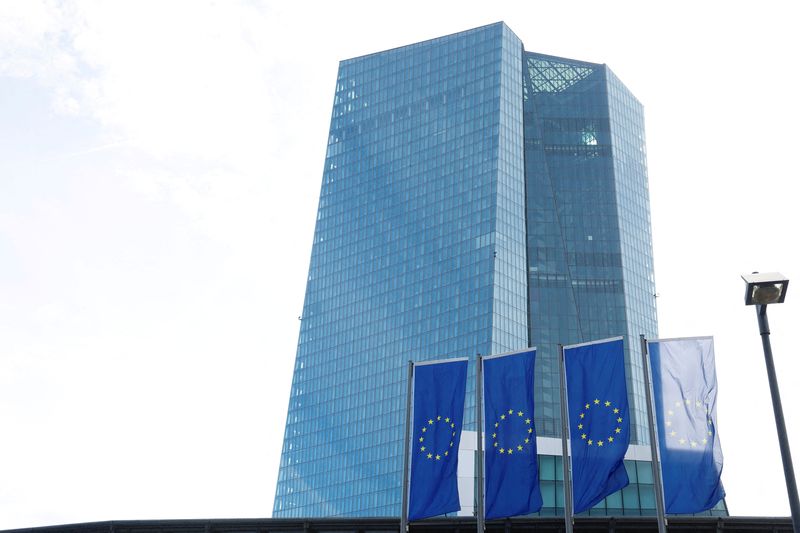By Joice Alves and Naomi Rovnick
LONDON (Reuters) - European banking stocks were meant to shine in 2023.
But after a two-week storm which had analysts and investors rushing to rework their spreadsheets, the outlook is clouded.
Before the fall of Silicon Valley Bank (SVB) on March 10, stronger than expected euro zone economic data and 50% fourth quarter earnings growth had prompted positive predictions.
That optimism lifted banking stocks in the region to a five-year high in February and fed hopes that the battered sector would finally see a rebound after years of underperformance compared to their U.S. competitors.
European shares are trading at around 0.65 times their price-to-book value, according to Refinitiv Datastream.
This is their lowest so far since early January. But the hit from the recent tumult was harder on U.S. banks, which are trading at around 0.87 times their price-to-book ratio, the lowest level since November 2020.
And the ructions have left the gap between the ratios of European and U.S. banks at its narrowest since September 2017.
(Graphic: European vs U.S. banks - https://fingfx.thomsonreuters.com/gfx/mkt/gdvzqkoeqpw/European%20vs%20U.S.%20banks.png)
The weeks of turmoil and the emergency takeover of Credit Suisse by UBS have dashed expectations for European banks as 2008-style volatility whip-sawed bank shares, with investors rapidly reviewing their holdings.
"We've been sharpening our pencils," said Paras Anand, chief investment officer at 24 billion pound ($30 billion) fund Artemis. After closely examining his fund's bank holdings, Anand decided to "selectively" add to positions.
Reflecting concerns over the stability of the sector, bank shares are set for an almost 15% monthly drop in March, after five consecutive months of gains.
And in a sign of wider uncertainty, Citigroup (NYSE:C) on Friday cut the global financials sector to neutral from overweight.
Refinitiv data shows analysts cut their forward 12-month earnings growth forecast for STOXX 600 banks, which includes euro zone and British banks but not the big Swiss lenders banks, to 9.4% in mid-March from 15% in February.
They have since revised up their expectations, to 11.2%. The February forecast had been the fastest for the sector since September 2021.
(Graphic: European bank earnings growth expectations - https://fingfx.thomsonreuters.com/gfx/mkt/jnpwyjnjapw/European%20banks%20earnings%20growth%20expectations.png)
'UNLIKELY TO BUY'
Other investors see pressure on European bank earnings as they anticipate the euro zone economy will slow down.
Investors are now forecasting that banks themselves will tighten lending standards and pay more to secure deposits as the rumblings which began in the U.S. banking system pressure institutions in Europe to demonstrate that they are well capitalised.
Europe's largest asset manager Amundi said a weaker economic backdrop means growth in net interest margins, a key measure of bank profitability, will be slower than expected and volumes will be lower given tighter credit conditions.
Peter Doherty, head of investment research at private bank Arbuthnot Latham in London, said he was "unlikely to buy" European bank stocks in the medium term, with the latest German investor morale survey signalling a bleak economic outlook.
"Traders will wait to see a bit more stability before they add more money to these (bank) stocks. A lot of people just want to make sure that the contagion fears abate before jumping back in," said Patrick Spencer, vice chair of equities at RW Baird.
Volatility last week in Deutsche Bank (ETR:DBKGn) shares, after the cost of insuring its debt against the risk of default jumped to a more than four-year high, intensified worries about the health of Europe's financial sector.
Politicians, regulators and central banks have stressed that the storm triggered by the collapse of SVB and Signature Bank (OTC:SBNY) in the U.S. was not a pre-cursor to a repeat of the 2008 global financial crisis and conditions now are very different.
But while European Central Bank (ECB) President Christine Lagarde told European lawmakers on March 20 the exposure of euro zone banks to Credit Suisse was in the millions rather than billions of euros, she nevertheless warned that they should prepare for higher funding costs and lower lending volumes.
'ROBUST' LIQUIDITY
ECB chief Lagarde also said concerns over a credit crunch in Europe were excessive as banks have high liquidity levels.
This view was echoed by Amundi, which said that the liquidity profile of European banks "still appears very robust with less competition from money market funds than in the U.S.".
Credit Suisse itself, which reduced European banks to 'marginal overweight', said they are in better shape than U.S. lenders as their liquidity coverage ratios (LCR), a measure of how much cash-like assets banks hold, are much higher.
In Europe, LCRs stand at 146% for major banks and 200% for smaller banks - well above the minimum requirement of 100%, while the U.S. majors have LCRs of 119%, Credit Suisse said, with real estate looking far less vulnerable in Europe.
But Barclays (LON:BARC), which upgraded European banks to overweight in late January, has cut the sector back to neutral, citing expectations for increased regulatory scrutiny, especially on liquidity requirements.
Also in the calculation mix is the ECB's campaign to raise interest rates to tackle rising inflation, which had previously been a boon for euro zone lenders.
However, some investors now worry that if the central bank continues to raise the cost of borrowing it could actually be against the interest of the banking sector as a whole.

The U.S. Federal Reserve's rate increases have been partly blamed for sparking banking system turmoil, as clients pulled deposits from their banks to meet liquidity needs.
($1 = 0.8123 pounds)